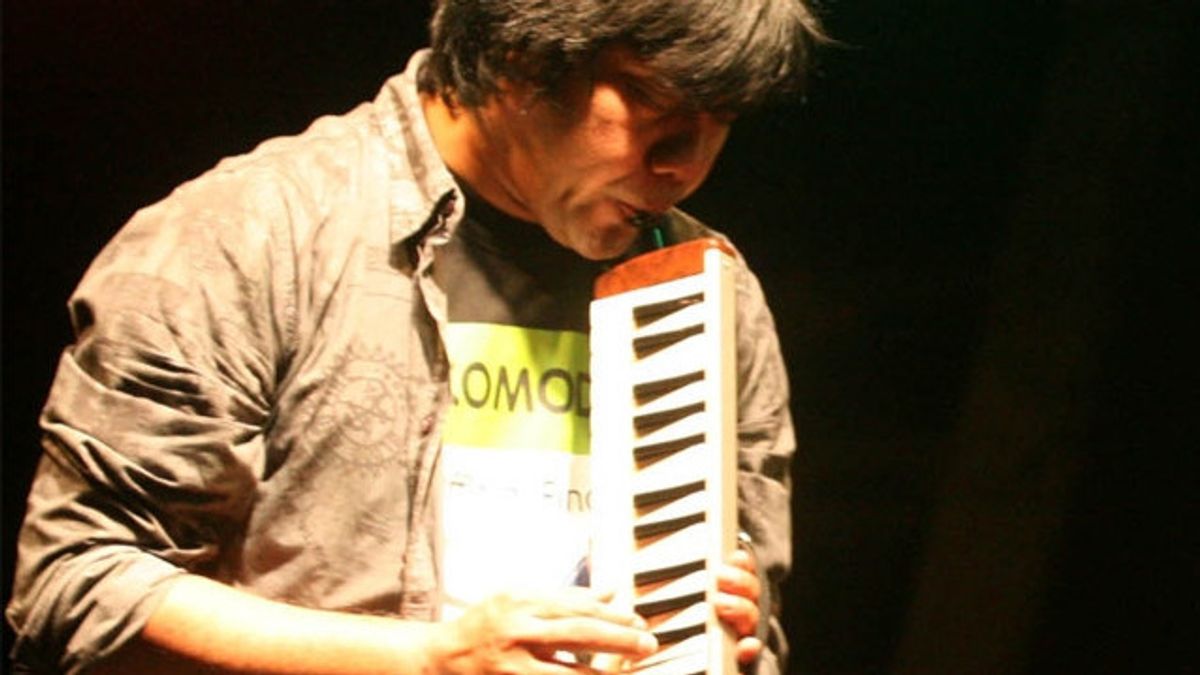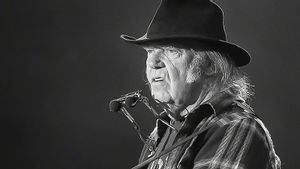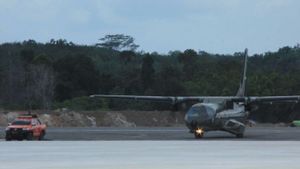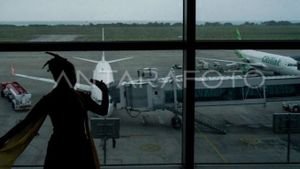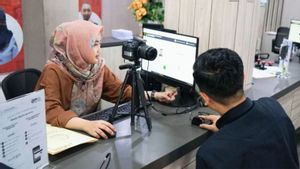JAKARTA - Government Regulation Number 56 of 2021 concerning Royalty Management of Song and / or Music Copyright was welcomed by the General Chairperson of the Collective Management Institute for the Association of Singers, Songwriters and Musicians of the Republic of Indonesia (PAPPRI) Dwiki Dharmawan.
He said this government regulation strengthens the contents of Law Number 28 of 2014 concerning Copyright
"All laws of course can only be implemented optimally if there are government regulations like this, (so) strengthened, as well as ministerial regulations. Of course, Government Regulation No. 56 of 2021 concerning the management of copyright royalties for songs and / or music is encouraging. for the music industry, "said Dwiki as quoted by Antara, Wednesday, April 7.
President Joko Widodo signed the PP on March 30, 2021. In Government Regulation Number 56 of 2021 Article 3, it is written, "Everyone can make commercial use of songs and / or music in the form of commercial public services by paying royalties to the creators, copyright holders. , and / or owners of Related Rights through LMKN (National Collective Management Institute). "
Royalty in question is a reward for the use of the economic rights of a work or related rights product received by the creator or the owner of the related rights.
Meanwhile, the National Collective Management Institute (LMKN) is a non-APBN government aid agency formed by ministers based on the Law on Copyright. LMKN has the authority to attract, collect and distribute royalties and manage the economic rights interests of creators and related rights owners in the field of songs and / or music.
Commercial users of songs and music referred to in this article include commercial seminars and conferences, restaurants, cafes, pubs, bars, distributions, nightclubs, discotheques, music concerts, planes, buses, trains, ships, exhibitions and bazaars, cinemas. , telephone waiting tones, banks and offices, shops, recreation centers, television broadcasting institutions, radio broadcasting institutions, hotels, hotel rooms and hotel facilities as well as karaoke businesses.
Through this regulation, song and music users such as restaurants, cafes, cinemas and shops that use copyrighted songs commercially are required to pay royalties. Nevertheless, he hopes that government regulations will be followed up by the relevant ministers so that royalty management can run more smoothly.
"This is encouraging but it must be followed up immediately with the relevant ministers, there must be a ministerial regulation for example to regulate tariffs, to determine royalties there must be tariffs agreed upon with the associations or from these entrepreneurs (in government regulations)," said the composer who is also a member of the famous jazz group Krakatau.
Currently the National Collective Management Institute (LMKN) has been formed and many Collective Management Institutions (LMK) have been established. LMK is divided into two, namely the Copyright LMK and the Related Rights LMK.
Copyright LMKs, such as Wahana Musik Indonesia (WAMI) and Karya Cipta Indonesia (KCI), collect and distribute royalties to creators or copyright holders from registered works. LMK Related Rights such as Anugrah Royalty Dangdut Indonesia (ARDI), the Association of Artist Singers, Songwriters and Musicians of the Republic of Indonesia (PAPPRI) and PRISINDO, collect and distribute royalties for performers such as musicians and producers from registered works.
Songwriters, singers, musicians and performers must become members of one of the Collective Management Organizations to obtain economic rights, including royalties. Music persons who have dual roles as songwriters and performers can join two LMKs, namely the Copyright LMK and the Related Rights LMK.
LMKN will collect royalties from users, referring to the Song and Music Information System (SILM), an information system and data used in the distribution of song and music royalties.
"For example, the Song and Music Information System translated by karaoke (business entrepreneurs) by providing a logsheet of the use of the songs, is reported to LMKN."
It is the same as restaurants, hotels and concerts that report the list of songs played to the public in a logsheet to LMKN, so that the entitled parties will receive royalties.
LMKN then distributes it to LMK who then distributes it to members.
In 2019, LMK PAPPRI distributed royalties of IDR 1.69 billion to its more than 470 members, an increase of around IDR 500 million from the previous year. In 2020, LMK PAPPRI will distribute royalties in the amount of IDR 2.5 billion.
Dwiki does not yet know the exact amount of royalties PAPPRI will pay this year, which is certain to be expected to decrease due to the pandemic.
"Users have decreased, such as from karaoke. How can they pay royalties during the pandemic, many have closed, so it must be understood the current conditions," said Dwiki.
The implementation of this government regulation will protect people in the music industry so that their income can increase. But honesty, integrity and mutual respect are needed in respecting intellectual property, in this case the users who use songs and music commercially and are responsible for reporting it to LMKN.
Dwiki explained that a similar system was also implemented elsewhere. "For example, I want to perform at a jazz festival abroad, before the performer appears, for example I will perform, write a song to be played. The song is given a description, whose creation, whose publisher, whose producer."
If he plays someone else's song, the festival committee will report it to the collecting society (such as LMKN) so that the original songwriter and publisher of the songs performed by him will receive royalties.
"If it is my own song, then I myself will benefit because I am from a publisher abroad that will be part of the performing rights, related rights," he said.
However, there are also other things that must be considered. Article 11 PP No.56 Year 2021 states that if users who use songs or music commercially are micro, small and medium enterprises (MSMEs), those users will be given a royalty rate reduction which will be determined by the minister.
"Don't let business actors in the tourism industry start to feel pressured by this, but this is a matter of intellectual property rights," he said.
Daily Chairman of the Association of Singing Artists, Songwriters and Musicians of the Republic of Indonesia (PAPPRI) Anang Hermansyah is also happy with this government regulation.
"If I say yes, this is a gift, from yesterday March National Music Day, yes I personally am very happy that the president is responsive and quick to carry out this, hopefully another derivative can be born," said Anang.
Anang said, this PP is the embodiment of Law Number 28 of 2014 concerning Copyright. The presence of Government Regulation Number 56 of 2021 is expected to improve royalty income that has been running to date. With this PP, LMKN can be more assertive in carrying out its duties.
Now, all parties, from law enforcers, associations to song and / or music users, must cooperate more so that Law Number 28 of 2014 can be implemented properly.
"Hopefully, with this government regulation, ministerial regulations and so on, the implementation of royalty withdrawals can be enforced. My hope is that this PP is born, in the realm of improving big data it can be carried out well," said Anang.
The English, Chinese, Japanese, Arabic, and French versions are automatically generated by the AI. So there may still be inaccuracies in translating, please always see Indonesian as our main language. (system supported by DigitalSiber.id)
